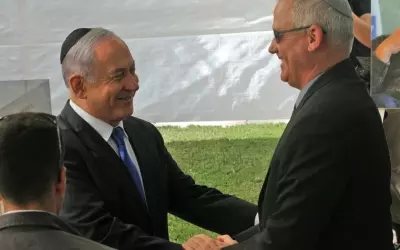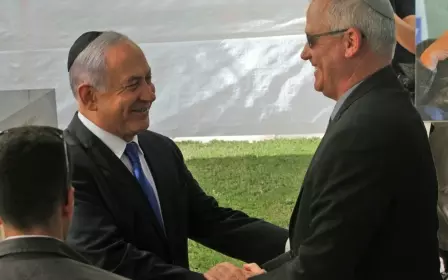Israeli Palestinian parties back Gantz for PM in break with precedent

Israeli Palestinian political parties broke with longstanding precedent on Sunday and endorsed ex-military chief Benny Gantz for prime minister following last week's elections, seeking to keep the president from asking incumbent Benjamin Netanyahu to form the next government.
The dramatic move came after the mainly Palestinian Joint List alliance won 13 seats in Tuesday's polls, making them the third-largest force in the 120-seat parliament, AFP said.
Its support does not mean the Joint List will sit in the governing coalition, but its backing gives Gantz's centre-left bloc 57 seats, compared with Netanyahu's right-wing bloc of 55, Reuters said.
President Reuven Rivlin has begun consultations with party leaders to decide which candidate he will choose to give the mandate to attempt to form a governing coalition, Haaretz said. He will announce his choice on Wednesday, after the Central Elections Committee confirms the final results.
New MEE newsletter: Jerusalem Dispatch
Sign up to get the latest insights and analysis on Israel-Palestine, alongside Turkey Unpacked and other MEE newsletters
//twitter.com/nytopinion/status/1175795550073040896?s=20
In announcing its decision, Joint List leader Ayman Odeh said the alliance's decision was not an endorsement of Gantz's policies but a move to oust Netanyahu, Israel's longest-serving prime minister.
Netanyahu has repeatedly been accused of political rhetoric and actions amounting to racism towards Israel's Palestinian population.
"We have become illegitimate in Israeli politics in the Netanyahu era," Odeh told Rivlin when informing him of the endorsement.
"We are this time recommending Benny Gantz to form the next government."
Odeh also wrote in a Sunday New York Times op-ed piece: "We will be the cornerstone of democracy. Arab Palestinian citizens cannot change the course of Israel alone, but change is impossible without us... We will decide who will be the next prime minister of Israel."
Balad, one of the four parties that make up the alliance, did not support the decision and did not send representatives to the president's office, but Joint List confirmed that its decision on whether to make a recommendation would apply to all 13 of its elected lawmakers, according to Haaretz.
Prominent Palestinian parliament member Ahmad Tibi said: "History is done: We'll do what is needed to bring down Netanyahu."
It was the first time that majority Palestinian parties had endorsed a candidate for prime minister since 1992, when they backed Yitzhak Rabin, who went on to sign the Oslo accords with the Palestinians.
Still, it was not at all certain that the Palestinian parties would succeed in their mission to end Netanyahu's long dominance of Israeli politics.
Rivlin, who began holding consultations with parties on Sunday to hear their recommendations on who should form the next government, said he believed both Netanyahu's right-wing Likud and Gantz's centrist Blue and White should be in the next coalition.
He must designate someone to form a government after the consultations, though there has been speculation that he will bring Gantz and Netanyahu together to explore options for a unity government.
Tuesday's elections ended in yet another deadlock, the second after April polls also finished inconclusively. Blue and White won the most seats, with 33 out of parliament's 120, while Likud finished second with 31. Neither has an obvious path to a majority coalition.
Gantz is expected to have the endorsement of 57 seats during Rivlin's consultations, which will continue on Monday. Netanyahu is expected to receive 55. Both appear to be short of the 61 seats needed for a majority.
Those totals do not include ex-defence minister Avigdor Lieberman's nationalist Yisrael Beitenu party, which won eight seats.
Lieberman, who could potentially play a kingmaker role, said on Sunday he will not endorse either Netanyahu or Gantz for now.
Lieberman has insisted on a unity government between his party, Netanyahu's right-wing Likud and Gantz's centrist Blue and White.
He said he could not for now back Netanyahu because the premier is willing to form a coalition with Israel's ultra-Orthodox Jewish parties, which he accuses of seeking to impose religious law on the secular population.
"As soon as Benjamin Netanyahu and Likud decided to form a bloc with ultra-Orthodox parties and religious fanatics, we can’t be part of that bloc," Haaretz quoted Lieberman as saying.
Lieberman also said he could not back Gantz for now because he may reach a deal with either the ultra-Orthodox or Israel's Palestinian parties, which he called "enemies."
Faced with disappointing results, Netanyahu last week acknowledged he was unable to form the right-wing coalition that he had hoped for and called on Gantz to join him in a unity government.
But Gantz, who has also called for a unity government, made his position clear: He must be prime minister under any such arrangement, because his party has the most seats.
Netanyahu era
Rivlin will "make every effort to prevent a third set of elections," Harel Tubi, director general of the president's office, told Israel's army radio on Sunday.
"The consultations will include new offers that the public has yet to hear."
The end of the Netanyahu era would be an extraordinary moment in Israeli politics.
He has been prime minister for a record-breaking total of more than 13 years.
But the 69-year-old faces potential corruption charges in the weeks ahead, pending a hearing set for early October.
Gantz has in the past spoken of his refusal to serve in a government with an indicted prime minister.
He has not repeated that demand in recent days, beyond saying he should be premier himself.
Middle East Eye delivers independent and unrivalled coverage and analysis of the Middle East, North Africa and beyond. To learn more about republishing this content and the associated fees, please fill out this form. More about MEE can be found here.





